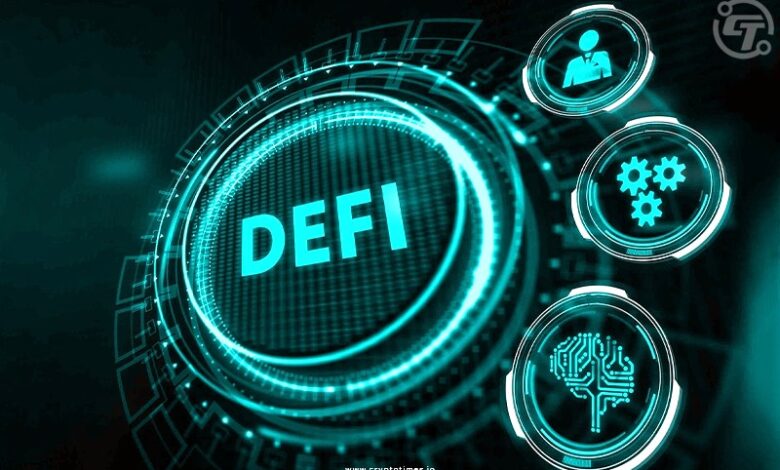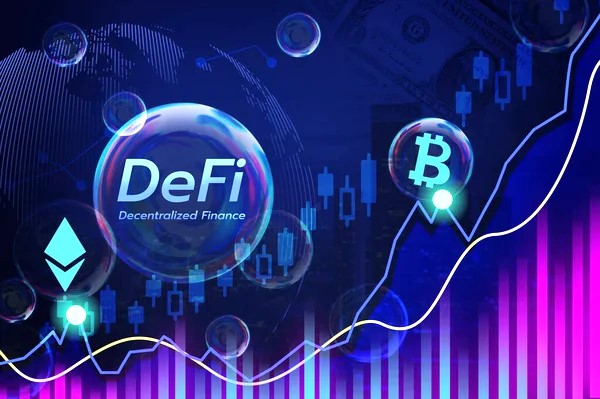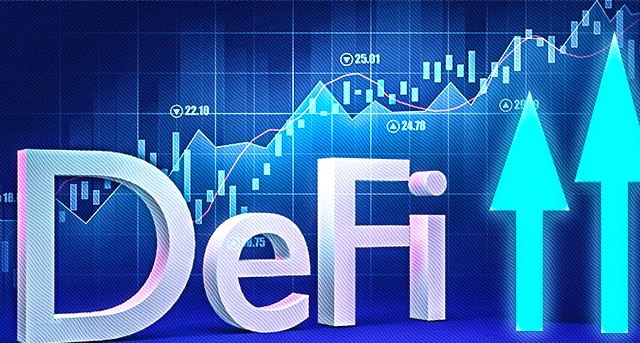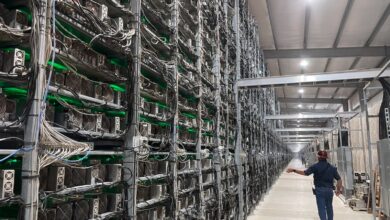The Rise of Decentralized Finance (DeFi): Unveiling the Future of Financial Freedom
Unlocking Financial Freedom: The Rise of Decentralized Finance (DeFi)

Decentralized Finance: In the ever-evolving landscape of finance, a groundbreaking revolution is underway, and its name is Decentralized Finance, or DeFi for short. DeFi represents a paradigm shift in how we perceive and interact with traditional financial systems. In this comprehensive guide, we will delve deep into the world of DeFi, exploring its definition, functionality, advantages, risks, popular applications, and what the future holds for this transformative technology.

What is Decentralized Finance (DeFi) and How Does It Work?
DeFi, short for Decentralized Finance, is a cutting-edge financial ecosystem built on blockchain technology. Unlike traditional finance, which relies on intermediaries like banks and brokerages, DeFi is a peer-to-peer system that operates without centralized authorities. Here’s how it works:
Decentralization:
DeFi platforms run on blockchain networks, which are decentralized ledgers. Transactions are recorded on a public ledger that is tamper-resistant and transparent.
Smart Contracts:
DeFi leverages smart contracts, self-executing agreements with predefined rules. These contracts automate financial processes, eliminating the need for intermediaries.
Tokenization:
Assets are tokenized on DeFi platforms, meaning they are represented as digital tokens on the blockchain. These tokens can represent various assets, such as cryptocurrencies, stocks, real estate, and more.
Liquidity Pools:
DeFi relies on liquidity pools, where users can lend, borrow, or trade assets. Users contribute to these pools and earn interest or fees in return.
Interoperability:
DeFi projects often interact with each other, creating a seamless financial ecosystem where users can access a wide range of services.
The Benefits and Risks of DeFi
Benefits of DeFi:
Financial Inclusion:
DeFi opens financial services to anyone with an internet connection, bridging the gap for the unbanked and underbanked.
Security: Blockchain’s cryptographic security measures make DeFi platforms highly secure against fraud and hacking.
Accessibility:
Users have full control of their funds and can access DeFi services 24/7, without relying on traditional banking hours.
Reduced Fees:
DeFi eliminates intermediaries, reducing transaction fees and making financial services more cost-effective.

Risks of DeFi:
Smart Contract Vulnerabilities:
Bugs or vulnerabilities in smart contracts can lead to significant losses.
Regulatory Uncertainty:
DeFi operates in a regulatory gray area, which may lead to legal challenges in the future.
Market Volatility:
Cryptocurrencies, a core component of DeFi, are known for their price volatility, which can affect the stability of DeFi projects.
Lack of Consumer Protection:
Unlike traditional banks, DeFi platforms do not offer FDIC insurance or similar protections.
Popular DeFi Applications
Decentralized Exchanges (DEXs):
Platforms like Uniswap and SushiSwap allow users to trade cryptocurrencies without intermediaries.
Lending and Borrowing:
DeFi platforms like Aave and Compound enable users to lend their assets and earn interest or borrow assets with collateral.
Stablecoins:
Stablecoins like USDC and DAI provide stability by pegging their value to a fiat currency like the US Dollar.
Yield Farming:
Users can earn rewards by providing liquidity to DeFi protocols through yield farming.
Non-Fungible Tokens (NFTs):
NFT marketplaces like OpenSea and Rarible operate on DeFi principles, enabling the creation and trade of unique digital assets.
How to Get Started with DeFi
Choose a Wallet: Start by selecting a secure cryptocurrency wallet to store your assets.
Research:
Thoroughly research DeFi projects and platforms to understand their goals, security measures, and user reviews.
Start Small:
Begin with a small investment to familiarize yourself with DeFi operations and mitigate potential risks.
Use Reputable Platforms:
Stick to well-established DeFi platforms and avoid suspicious or unverified projects.
Stay Informed:
Keep up with the latest news and developments in the DeFi space to make informed decisions.
The Future of DeFi
The future of DeFi holds immense promise. As blockchain technology matures and regulatory frameworks evolve, we can expect:
Mainstream Adoption:
DeFi could become a mainstream financial alternative, offering services that rival traditional banks.
Improved Security:
Ongoing advancements in blockchain technology will enhance the security of DeFi platforms.
Regulatory Clarity:
As governments worldwide work on regulating cryptocurrencies, DeFi will likely become more transparent and compliant.
Innovation:
DeFi will continue to innovate, potentially expanding to areas such as insurance, asset management, and cross-border payments.
Global Financial Inclusion:
DeFi has the potential to bring financial services to underserved regions, contributing to global financial inclusion.

FAQs:
Is DeFi safe?
DeFi can be secure if you take proper precautions. Use reputable platforms, secure wallets, and stay informed about potential risks.
How can I earn money with DeFi?
You can earn through DeFi by providing liquidity, staking, yield farming, or participating in lending and borrowing.
Are my funds insured in DeFi?
DeFi platforms do not offer traditional insurance, so your funds are not insured as they would be in a bank.
What are the risks of using DeFi platforms?
Risks include smart contract vulnerabilities, regulatory uncertainty, market volatility, and potential loss of funds.
Can I use DeFi without prior knowledge of cryptocurrencies?
While it’s possible, it’s advisable to have a basic understanding of cryptocurrencies before diving into DeFi.
Are there age restrictions for using DeFi?
DeFi platforms often have no age restrictions, but local regulations may apply.
How do I choose the right DeFi platform?
Research and select platforms with a solid track record, transparent operations, and positive user reviews.
What is the difference between DeFi and traditional finance?
DeFi operates without intermediaries, is open to anyone, and offers greater control over your assets compared to traditional finance.
How do I secure my DeFi investments?
Use secure wallets, enable two-factor authentication, and stay updated on security best practices.
Can I use DeFi on my mobile device?
Yes, many DeFi platforms offer mobile apps for convenient access.
Conclusion:
In conclusion, the rise of Decentralized Finance (DeFi) represents a remarkable evolution in the financial industry, offering unprecedented opportunities and challenges. By understanding how DeFi works, its benefits and risks, and the exciting future it holds, individuals can make informed decisions about their financial participation in this decentralized ecosystem. As DeFi continues to disrupt traditional finance and pave the way for financial inclusivity and innovation, staying informed and vigilant will be key to harnessing its full potential while navigating its complexities. The future of finance is undeniably decentralized, and embracing it with caution and curiosity can lead to a more financially empowered and connected world.



